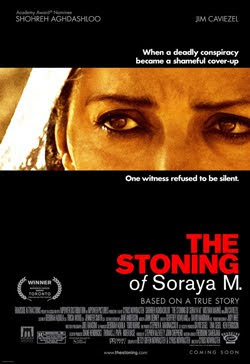The Stoning of Soraya M (***)
 Directed by: Cyrus Nowrasteh
Directed by: Cyrus NowrastehStarring: Shohreh Aghdashloo, Jim Caviezel, Mozhan Marnò, Navid Negahban, Ali Pourtash, David Diaan, Parviz Sayyad
Seen: November 29th 2009
*** Out of ****
The Stoning of Soraya M is based on the true story recorded in the book of the same name by French-Iranian Journalist Freidoune Sahebjam (portrayed in the film by Jim Caviezel and a remarkable prosthetic nose). The story starts with Sahebjam’s car giving trouble in a remote part of Iran, and after being towed to the nearest town by a bus, his short time in the small village with the story he uncovers there.
While his car is being worked on by the town mechanic Hashem (Sayyad), Sahebjam is approached by Zahra (Aghdashloo), to take her story to the world. At first Sahebjam is sceptical, but he follows Zahra to her home, where she requests him to start recording her story so the world may know of the atrocities being committed in her village. When she starts smoking he even mentions to her that the Ayatollah has banned women from smoking, to which she does not even reply, but only smiles. The story she tells is that of events that transpired the day before, when her niece, Soraya (Marnò), was stoned to death by the locals.
What drives the story is the way in which the men in this town, and especially Ali (Negahban), Soraya’s husband, schemes against Soraya. Ali wants a divorce (simply put, but he actually just wants to get rid of Soraya as his wife in any possible way) to enable him to marry a 14-year old girl who “knows what it means to be a wife”. So he starts looking for ways to get her out of the way, and after the death of Hashem’s wife and Soraya subsequently going to work for him, he starts plotting his way to the “good life”. Suffice it to say that from here the viewer can do nothing but join in with Zahra and Soraya’s plight for fairness, and that the denial of it (with the increasing levels of unfairness) can be quite infuriating.
This is an important film, as it (slowly) starts to show the international community what is transpiring in third-world countries where radical religion is being adapted/perverted to fit personal agendas by those in power in certain communities. Bill Maher spoke about the danger of religion in his documentary Religulous last year, and this is a prime example of the danger he spoke about. When religion is being incorporated into governments and left to personal interpretation it is nothing but pure evil. The baying of the hounds is the best way to describe the noise of the men stoning Soraya in this film, and the scene is not unique, not by a long shot, and neither is the bloated public officials and powerful individuals portrayed in The Stoning of Soraya M.
This film is not easy to watch, as the stoning is shown in gruesome detail, but it is something that reminds you that there is a great deal of people around the world that do not enjoy the kind of freedom we do. Shohreh Aghdashloo is brilliant as the films main protagonist, and the men all act out their (sometimes subversive) evil nature with gusto. If you are easily upset, do not venture into this film easily, but try to see it nonetheless, as it is a powerful ride.


Comments